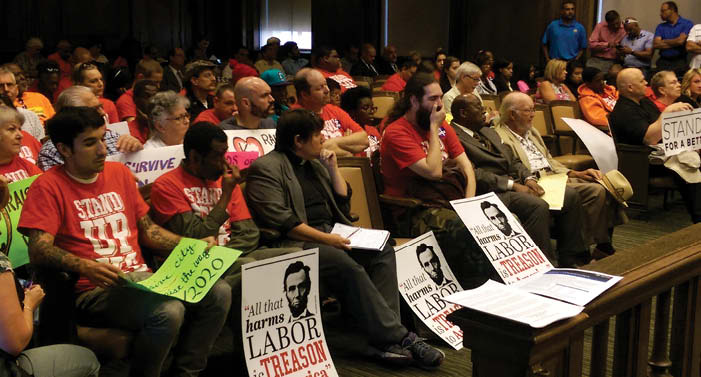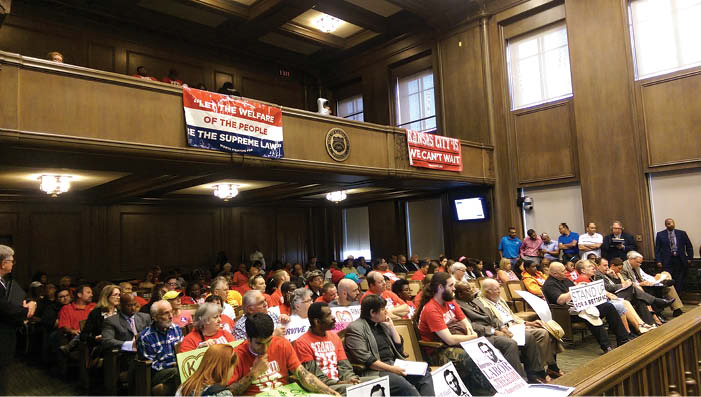
By Joe Jarosz
Northeast News
July 22, 2015
KANSAS CITY, Missouri — Last week, Kansas City joined other major U.S. cities such as Los Angeles, Seattle and San Francisco, to gradually raise the minimum wage over the next few years.
At last week’s city council meeting, the council passed an ordinance — with councilman Ed Ford casting the lone dissenting vote — raising the minimum hourly wage in the city to $8.50 next month. The raises continue until Jan. 1, 2020, when it’ll stop at $13 an hour. The council began this process this past March, with the introduction of the minimum wage ordinance by Third District Councilman Jermaine Reed.
The ordinance requires that in five weeks, on Aug. 24, 2015, Kansas City employers with more than 15 employees must begin paying workers $8.50 an hour, an increase from the current state-mandated minimum wage of $7.65 per hour. Beginning Jan. 1, 2017, the Kansas City minimum wage would increase to $9.82 per hour; then $10.96 per hour on Jan. 1, 2018; $11.98 per hour on Jan. 1, 2019; and finally settle at $13 per hour on Jan. 1, 2020. Beginning Jan. 1, 2021, the minimum wage would be adjusted annually based on the cost of living. The original ordinance called for $15 an hour by the year 2023. Currently, less than 50 percent of Missourians earn less than $15 per hour.
After the ordinance passed, the roughly 100 residents gathered in the council chambers erupted in applause. After the meeting, Vanessa Crawford Aragon, Executive Director for the Missouri Immigrant and Refuge Advocates, said this is a huge victory for the working people of Kansas City.
“We’ve got a long way to go but this is a great first step,” Crawford Aragon said.
The ordinance, however, included several exemptions. The ordinance would not apply to employees under the age of 18 years old and government employees, except employees of Kansas City, Mo.; apprentices; workers in certain volunteer or charitable occupations, and interns working for academic credit. Employers whose workers receive tips as part of their compensation would be required to pay no less than 50 percent of the minimum wage established by Missouri law.
If a Kansas City business fails to increase their employees minimum wage, they could be subjected to a fine of $1,000 per person, per day. However, during the council session, city officials admitted enforcement may be difficult, at least at first, noting it will probably take at least six months to have adequate staff in place to enforce the ordinance. The city doesn’t enforce minimum wage restrictions now because it’s not the city’s responsibility. That responsibility lies with the state and federal government.
Mayor Sly James said the vote by the council is an attempt to do the right thing not just for minimum wage workers, but for the future of Kansas City. He added he knew the sentiment was there and expected the council to do the right thing from the beginning.
“I want to thank the City Council especially Councilmen Scott Wagner and Jermaine Reed and members of my staff for their very hard work on minimum wage,” James said. “I hope they agree with me that our work the past few weeks is among the most important we have done together. The community input from proponents, opponents and everyone in between was heartfelt, and valuable. I want to thank everyone who contributed, whether a single phone call to my office or hours of work with the stakeholder group.”
However, James went so far as to say this measure is more so a bandaid for the real issue at stake, education. As long as there are people with limited skill options, he added, there will be businesses that take advantage of that and pay the lowest wages possible.
“The only way to ever really wipe out that issue is to raise the skills of everybody to such an extent that there’s simply not enough people to populate and do all the jobs that are being paid for at minimum wages and the only way to do that is through education,” James said. “I would love it if we could get everyone riled up about the fact that only one in six kids in KCPS reads at grade level at third grade or one in three kids in this entire city reads at their grade level. But instead of addressing the root issue, we’re putting a bandaid on the acute issue.”
James said even though the city has zero control over the 15 school districts in Kansas City, he said the city has programs in place to help children across the city better their reading abilities. Last week, the Sprint Center hosted nearly Turn the Page KC, as the mayor read and talked about the importance of reading to nearly 1,300 children. James added there are programs during the summer so students avoid the “summer slide,” nearly 700 adults who travel the city reading to children every week and during his tenure as mayor, has visited nearly 100 schools reading to students.
“We’re having some marginal success,” James said. “We are preparing kids inadequately for the jobs that exist today. And we’re not doing anything to change that so that we prepare them better for the jobs that are going to exist in 10 years.”












